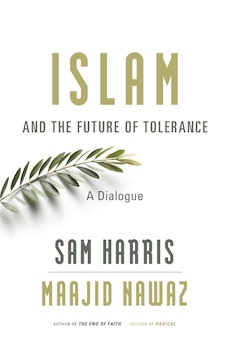By LaiYee Leong
One of the most vexing questions facing Muslims today is: who speaks for Islam? In this slim volume, Maajid Nawaz and Sam Harris engage in a frank albeit respectful conversation that attempts an answer to that question, among others. Their wide-ranging exchange highlights the multifaceted complexity represented by the world’s second largest religion. As others have argued, Islamic scripture has always actively demanded interpretation. Muslims have long embraced a multitude of ways to make meaning of the values and responsibilities that Islam embodies. Nawaz rightfully notes that jihadists constitute a remarkably small group within the Muslim community. He fails, however, to make the case that the fanatical political ideology of violent extremists has no basis in Islamic holy and historical sources. As Nawaz all but acknowledges, the very quality that makes Islam so dynamic and multivocal also opens it to religious radicalism. One can see why delegitimizing the siren call of jihadists who claim to speak for a “pure” Islam – without subtlety and without regard for traditional scholarship – is so challenging.
The face-off between Nawaz and Harris honestly and insightfully explores the seemingly intractable concerns in Islam and their implications for the post-9/11 world. Harris, a well-known scientist and critic of organized religion, pulls no punches in pointing out the most controversial aspects of Islam, including its demonization of non-believers, its call for the killing of apostates, and its promise of martyrdom to those who act violently in Allah’s name. These are the central underpinnings of jihadism today. In response, Nawaz tackles these topics head-on. He carefully examines the sources themselves and provides thoughtful references to historical context. He explains how the crude distillation of Islam by extremists to justify violence willfully ignores a rich tradition of scholarship. The established practice is one that insists on scrutinizing the Quran and other sources of religious authority in a holistic manner. Indeed, Nawaz calls out radicals for engaging in “vacuous” interpretation because they seek a simplified and unchanging Islam that belies centuries of jurisprudence, philosophy, and morality. Nawaz should know the perspective of jihadists; he himself had been one as a younger man, read the Quran diligently, and spent several years in an Egyptian jail with others intent on religious revolution. (His memoir Radical provides a riveting account.) Now he heads Quilliam, a British think-tank that seeks to counter extremist narratives by advocating Islam-based discourse compatible with pluralism and democracy.
Nawaz says over and over that there does not exist one “correct” reading of scripture. As he sees it, the real debate is not about literal meaning but the approach to interpretation. Many scholars of Islam, both Muslim and non-Muslim, would agree with him on this score. (Nawaz nonetheless makes the case that, were the Quran to be read literally with care to the original meaning of critical words in many instances, the result could be surprisingly liberal.) The absence of a central religious authority akin to the Pope means Muslim scholars or ulama can diverge in the methodology by which they glean understanding. Pluralism within Islam faces challenge only quite recently with the rise of Islamism. Islamism is a political movement that aims to impose a single validated interpretation of the religion on the state and its citizens. Nawaz argues such motivation contradicts the inherent capacity for tolerance within Islam as Muslims have mostly practiced it historically.
In turn, Harris critically observes that many contemporary Muslims, including a significant number who live in Europe and North America, express sympathy with jihadists and their methods. Nawaz concedes the case and blames it on “tribal” feeling, which he condemns. He agrees with Harris that the careless label of Islamophobia shuts down the acute need for self-examination within the Muslim community. The challenge for well-meaning Muslims and their allies, Nawaz points out, is to distinguish conservative Muslims – who form a majority – from the minority of Islamists and the even fewer violent extremists. Conservatives oppose social values such as gender equality and gay rights, but they do not oppose the secular state. Most in fact prefer an autonomous religious sphere different from the politicized version advanced by Islamists. Nawaz and Harris concur that reclaiming and negotiating this delicate terrain represents the path forward for greater tolerance among Muslims and non-believers alike.
LaiYee Leong is a fellow at the John G. Tower Center for Political Studies at Southern Methodist University and a fellow at the SMU Center for Presidential History. Southern Methodist is home to the Gamma of Texas chapter of Phi Beta Kappa.




